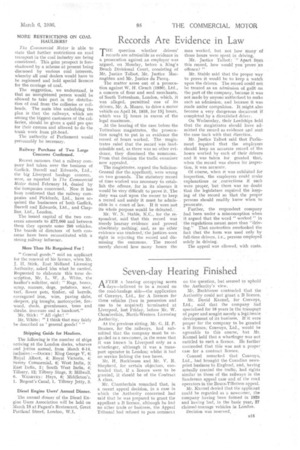Records Are Evidence in Law
Page 25

If you've noticed an error in this article please click here to report it so we can fix it.
THEquestion whether drivers' records are admissible as evidence in a prosecution against an employer was argued, on Monday, before a King's Bench Divisional Court, consisting of Mr. Justice Talbot, Mr. Justice Macnaghten and Mr. Justice do Parcq.
The matter arose out of a prosecution against W. H. Clench (1930), Ltd., a concern of flour and seed merchants, of South Tottenham, London, which, it was alleged, permitted one of its drivers, Mc. A. Munro, to drive a motor vehicle on April 16, 1935, for 131 hours, which was 2i hours in excess of the legal maximum., At the hearing of the case before the Tottenham magistrates, the prosecution sought. to put in as evidence the Tecord of hours worked. The • magistrates ruled that the record :was inadmissible and, as there was no other evidence, they dismissed -the summens. From that decision the truffle examiner
now appealed. -.
The magistrates, argued the SolicitorGeneral (for the appellant), were wrong on two grounds. The statutory record of time worked was necessary to establish the offence, for in its absenee it would be vrety difficult to'prove iteThe duty was cast upon the owner to keep a record and surely it Must be admissible in .a e.ourt of law, If it were,not its Whole purpose .would be defeated.'..
Mr. W. N. Stable, K.C.„ for the ,respondeut, said that this record was merely hearsay evidence and proved absolutely nothing' and, as 'nip other evidence was tendered/the ju.sticeawere right in rejecting the record and dismissing the summons. The record merely showed how many hours the man worked, but not how many of those houes were spent in driving, Mr. Justice Talbot: Apart from this record, how would you 'prove art offence? "
Mr. Stable said that the proper way to prove it would be to keep a watch upon the drivers. The record could not be treated as an admission of guilt on the part of the company, because it was
not made by anyone authorized'to make such an admission,, and because it was made under coinpu4ion. It might. also become a very dangerous document if, completed by a dissatisfied dd.-Ver.
On Wednesday,. their Lordships held that the magistrates should have admitted the record as evidence and sent the case back with that directicn, Mr. Justice Talbot said that Parliament required -that the employers
should keep an accurate record of the hours worked by each of their drivers and it was taken for granted that, when the record was shown for inspection, it was accurate.
Of course, when it was exhillited for inspection, the employers could make
explanations or. ..corrections if such
were proper, but there was no doubt that the legislature required the keep ing of the record so that the proper persons should readily know when to prosecute.
Further, the respondent company had been under a misconception when
it argued that the word " worked " in the regulations meant more than "driving." That contention overlooked the fact that the form was used only by full-time drivers, i.e., persons employed solely in driving.
The appeal was allowed, with costs.




















































































